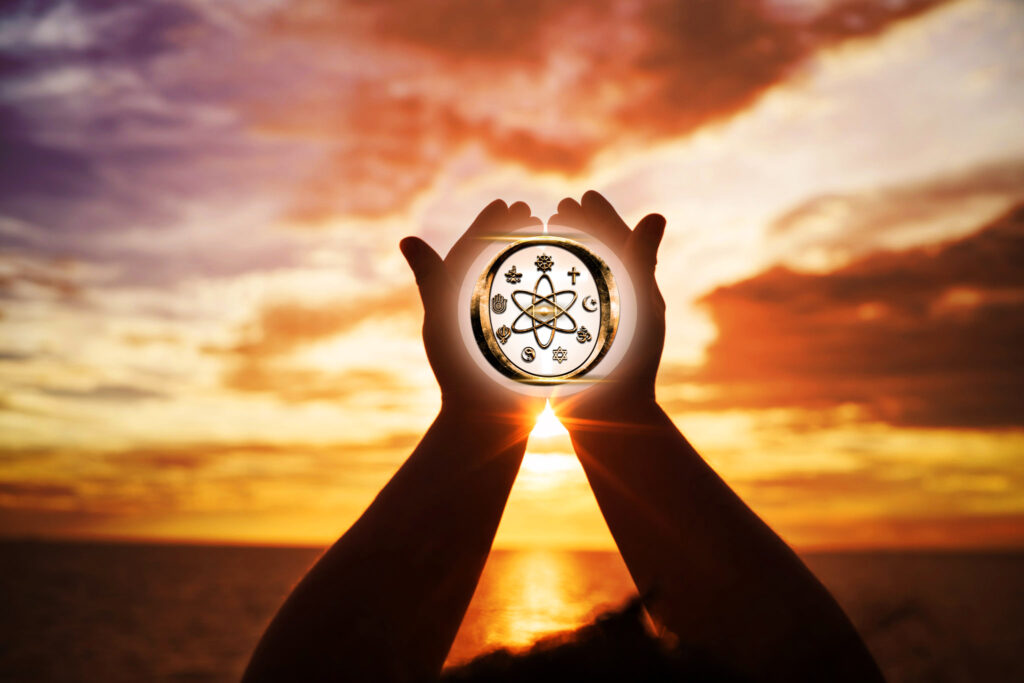GOD AND RELIGION
GOD IN SCIENTIFIC TERMS
“If you study science deep enough and long enough, it will force you to believe in God.” - Lord William Kelvin
Who or what is God?
God is the summation of all the forces and energies of the Universe, to which humankind has assigned a name and a form. Humankind relates to God by worship. Books About Religion and Science, both agree that the Universe is the apex of existence and that the Universal energy or force is the conglomeration of the forces existing within it. Hence it is easy to understand why religion preaches that God, which is the term we use to denote Universal Power, is all-perfect and all-powerful and is the Supreme knowledge.
GOD IN SCIENTIFIC TERMS
By extrapolation, then, God or the Universal energy is also the creator of everything. Incarnations and reincarnations are simply condensations of the same energy, that form physical masses, including living and non-living objects. Since this power, force or energy is all-pervading and affects everything within the space it occupies, this Universal energy “governs” everything within it.
Further, the energy within individual living and non-living objects and the energy outside the physical dimensions of these objects are one and the same – that of the Universe; hence the concept, that God is both, within us and without us.
Therefore, although the approaches are different, the ultimate goal of both, religion and science, is the same – that of reaching out to the Universe and its objects and striving to connect with them in a better way.
CONNECTING WITH GOD OR THE UNIVERSAL POWER
Religious texts were authored to create an awareness of God and the Universe, stimulate its followers to communicate with God and to provide guidelines and instructions on ways to remain in perfect tune with God and the Universe and everything within the Universe.
Religion and philosophy prescribe good ethics and morals as a means of harmonizing one’s thoughts, words and deeds with the Universal Power. How they scientifically achieve this is explained in the next chapter. Although human behavior, at times is unpredictable, for most of the time it is conscious and therefore predictable. Ethical teaching focuses on this conscious development of a pattern of behavior that will maintain our harmony with the Universe
THE DUALITY OF EXISTENCE AND WHY IT EXISTS
The Universe and all that exists within it is perceived in terms of duality by humankind. This includes actual physical dualities such as large and small, cold and hot, dark and bright and so on, and also includes abstract dualities such as good and bad, happy and sad and so on
ETHICAL AND RELIGIOUS VIEWS ON NEED AND PLEASURE
Food, clothing, shelter, the need for love and appreciation, need for safety and security and conventional sex for preservation of the species are basic human needs. Anything beyond this is sought to derive pleasure.
Every religion has scriptures that preach a moral code of conduct, performance of rituals and ceremonies and guidelines on how to perform important social rituals such as christening, baptism, marriage and so on. Almost all religions advise fasting, penance of some form, sacrifice, restrictions regarding food, attire, sex and social behavior. The brains of human beings are designed to experience pleasure -this provision gives a feedback to the brain to repeat pleasure-giving activities. As a result human beings seek pleasure even when satisfying their basic needs such as food, clothing, sex, acquisition of wealth and so on. They do so by instinct.
o If actions that give us pleasure, in no way harm or disturb anyone or anything, they do not disturb our connection with the Universe even if pleasure be the only motive.
o If pursued in a way that they harm oneself or others, they annihilate our connection with the Universe, because they disturb our own well-being and / or the well-being of others, and therefore of the Universe itself.
o Following certain restrictions or renunciation does not necessarily make a person more spiritual.
o Contravening social restrictions or indulging in luxuries does not necessarily make one less spiritual either.
o However, it is neither necessary to follow restrictions and make sacrifices just to prove their importance in our Universal connection, nor is it necessary to shun all restrictions just to prove that we can live in harmony with the Universe, without them.
o Both these actions affect our connection with the Universe only in the context of the sum total of our thoughts, word and actions, because the harmony of our connection with the Universe depends on the overall energy vibrations of our thoughts, words and actions for the most of our conscious living – if they are harmonious, we make our connection with the Universe harmonious
"A scientific discovery is also a religious discovery. There is no conflict between science and religion.
Our knowledge of God is made larger with every discovery we make about the world.”
- Joseph H. Taylor, Jr.

